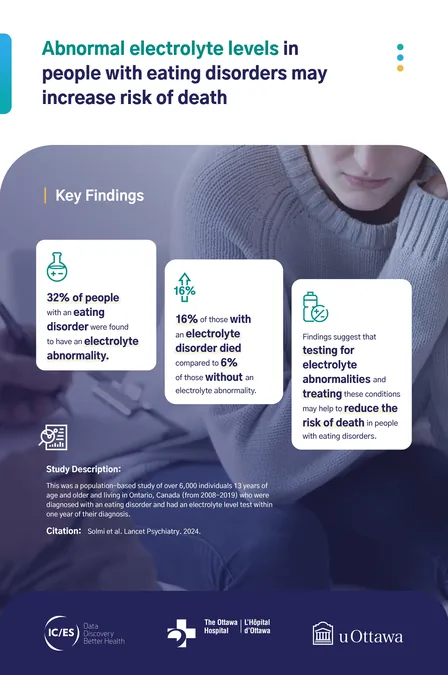
Shocking New Study Reveals Eating Disorders Could Double the Risk of Death Due to Electrolyte Imbalances!
2024-09-17
Groundbreaking New Study
A groundbreaking new study published in The Lancet Psychiatry has uncovered alarming statistics regarding individuals with eating disorders. It found that 32% of those affected show abnormal electrolyte levels, which significantly elevate their risk of death from any cause. This compelling research, conducted by scientists from ICES and The Ottawa Hospital, highlights the dire health implications associated with electrolyte imbalances in this vulnerable population.
The Study and Its Findings
The report, titled "Adverse outcomes and mortality in individuals with eating disorder-related electrolyte abnormalities: a population-based cohort study in Ontario, Canada," is one of the first large-scale population studies providing crucial insight into this grave relationship. The study indicates that individuals struggling with eating disorders not only face life-threatening electrolyte abnormalities but also face the risk of developing additional severe health issues such as chronic kidney disease, bone fractures, bowel obstructions, and acute kidney injury.
The Role of Electrolytes
Electrolytes like potassium and sodium are vital for numerous body functions, and deficiencies or imbalances are often seen in individuals with eating disorders, typically due to purging behaviors, laxative abuse, and severe dehydration. "These findings could lead to a critical re-evaluation of how we assess the severity of eating disorders," stated Dr. Marco Solmi, lead author and Medical Director of the Regional Eating Disorder Program at The Ottawa Hospital. His insights emphasize the potential role of electrolyte levels in determining treatment and prevention strategies.
Study Demographics and Statistics
The team analyzed health records from over 6,000 patients aged 13 and older who had been diagnosed with an eating disorder and had undergone tests for electrolyte levels within a year of their diagnosis, from 2008 to 2019 in Ontario. Results showed that a majority of participants were diagnosed with unspecified eating disorders (59%); anorexia nervosa accounted for 22%, while bulimia nervosa made up 15%. Most individuals were around 27 years old, with a staggering 89% being female.
Worrying Outcomes
Worryingly, among those with electrolyte disturbances, 16% tragically died, while only 6% of those without these imbalances faced similar fates. Furthermore, electrolyte-related health issues correlated with a higher likelihood of hospitalization and serious conditions, excluding infections or heart disease events.
Recommendations for Practice
In light of these findings, the researchers strongly advocate for routine electrolyte testing among patients with eating disorders, suggesting that recognizing and addressing these abnormalities could drastically reduce mortality rates and improve health outcomes. Co-lead author Dr. Nicholas Fabiano, a psychiatry resident, points to the potential life-saving implications of proactive monitoring and treatment.
Need for Greater Awareness
The study also highlights an urgent need for greater patient education and awareness. "Eating disorders can manifest in ways that patients often deny or fail to grasp in terms of health consequences. Our research sheds light on the serious long-term repercussions these disorders can have, particularly when electrolyte imbalances occur," emphasized Dr. Gregory Hundemer, a nephrologist and senior author.
Implications for Clinical Practice
This study has profound implications for the clinical approach to eating disorders. Researchers suggest that incorporating electrolyte abnormalities into the criteria for assessing the severity of these disorders can enhance care and potentially save lives.
Conclusion and Call to Action
As we face this ongoing public health crisis, it is imperative to spread awareness about the hidden dangers of eating disorders and the critical role electrolytes play in sustaining life. Let’s push for the necessary changes in treatment protocols—because every life matters!

 Brasil (PT)
Brasil (PT)
 Canada (EN)
Canada (EN)
 Chile (ES)
Chile (ES)
 España (ES)
España (ES)
 France (FR)
France (FR)
 Hong Kong (EN)
Hong Kong (EN)
 Italia (IT)
Italia (IT)
 日本 (JA)
日本 (JA)
 Magyarország (HU)
Magyarország (HU)
 Norge (NO)
Norge (NO)
 Polska (PL)
Polska (PL)
 Schweiz (DE)
Schweiz (DE)
 Singapore (EN)
Singapore (EN)
 Sverige (SV)
Sverige (SV)
 Suomi (FI)
Suomi (FI)
 Türkiye (TR)
Türkiye (TR)